×
The Standard e-Paper
Smart Minds Choose Us

Guyo Jattani had grand plans at the start of this year. Plans that included spending time with his younger brother and strategising on the year ahead.
But instead of this usual script playing out, on January 28 this year, Guyo sat beside his younger brother Richard Jattani, who was fighting for his life at the Moyale Sub-county Hospital.